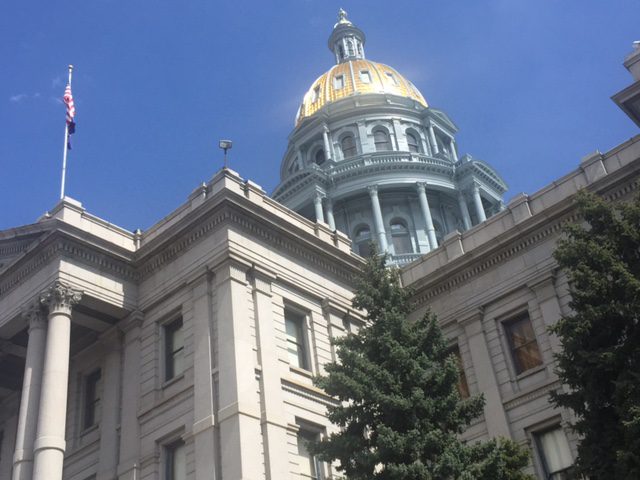A summary of the list of recommendations on the implementation of the OBBBA in Colorado regarding public benefits systems and work requirements.
Recent articles
CCLP testifies in support of Colorado’s AI Sunshine Act
Charles Brennan provided testimony in support of Senate Bill 25B-004, Increase Transparency for Algorithmic Systems, during the 2025 Special Session. CCLP is in support of SB25B-004.
Coloradans launch 2026 ballot push for graduated state income tax
New ballot measure proposals would cut taxes for 98 percent of Coloradans, raise revenue to address budget crisis.
CCLP statement on the executive order and Colorado’s endless budget catastrophe
Coloradans deserve better than the artificial budget crisis that led to today's crippling cuts by Governor Jared Polis.
Legislative Update: March 8, 2019

Bill to Watch: SB 180
According to the Legal Services Corporation, low-income Americans received inadequate or no legal help with 86 percent of their civil legal problems.
Unfortunately, this situation is painfully evident in Colorado, where the affordable housing crisis has reached epidemic proportions. According to a 2017 study by Colorado Coalition for the Homeless and CCLP, fewer than 1 percent of tenants in Denver County were represented by an attorney during an eviction proceeding, while 90 percent of landlords were represented. However, the very few tenants able to retain an attorney were much more likely to remain in their homes.
Eviction is extremely destabilizing for individuals, families and communities. Renters who are evicted are often pushed into neighborhoods with substandard housing conditions, poorer health outcomes and more poverty. In addition, housing instability for tenants with children strains family relationships and academic performance – leading to behavioral problems, substance abuse and homelessness later in life.
Developed by CCLP, Senate Bill 180 would appropriate funds to provide legal assistance for low-income Coloradans facing eviction and help them to avoid the devastating trauma of a forced move. Sponsored by Sen. Faith Winter and Rep. Julie McCluskie, the bill has been assigned to the Senate Judiciary Committee. Learn more about the bill and other eviction-related legislation in this article in Colorado Lawyer.
Bill to Watch: HB 1223
The federal cash assistance programs, Supplemental Security Income (SSI) and Social Security Disability Insurance (SSDI), help to ensure that people living with disabilities can meet their basic needs. The programs provide a monthly income that helps people with disabilities avoid homelessness, engage in health-maintenance activities and experience well-being.
But it can take a year or longer for an eligible person to get approved for these programs. Delays ensue in large part because the application process is complex and applicants must navigate it while contending with debilitating mental and/or physical health conditions. As a result, applicants are often denied multiple times because they submit applications deemed incomplete or insufficient, even though they meet the eligibility requirements. The state’s Aid to the Needy Disabled program provides $217 per month to individuals with severe disabilities while they are applying for SSI/SSDI, but AND clients struggle to meet their most basic needs and are often homeless.
Developed by CCLP, Colorado Coalition for the Homeless and Colorado Cross-Disability Coalition, House Bill 1223 would create a statewide program that helps individuals with severe disabilities navigate the process of applying for SSI and SSDI. The program will be administered by the Colorado Department of Human Services and implemented by participating counties. The bill would target Coloradans with the greatest need by making SSI/SSDI application assistance available to AND applicants and recipients.
Sponsored by Reps. Dafna Michaelson Jenet and Colin Larson and Sen. Faith Winter, the bill is scheduled to be heard by the House State, Veterans and Military Affairs Committee on March 19.
On the Radar
Coloradans of color fare worse on all measures than Colorado’s white residents. In fact, the gaps in economic wellbeing, health and educational attainment are so large in Colorado, that Prosperity Now’s Scorecard data gave us a racial disparity rank of 42 among the 50 states and DC. That is way too close to dead last. HB 1184 would require the non-partisan professional staff of the legislative council to prepare demographic notes on legislation to outline potential disparate effects on various populations within Colorado, as identified by race, gender, disability, age, geography, income or other relevant characteristics. The measure was approved by the House Finance Committee on a vote of 6-3. CCLP’s Allison Neswood testified in support of the bill on March 4.
So-called surprise bills can result when people receive emergency services from facilities that are not covered by their insurance plans. Those bills can be in the tens or even hundreds of thousands of dollars above contracted rates. Though state law holds consumers harmless for these bills, consumers often pay them or suffer financial consequences as a result. CCLP supports HB 1174, which would outline clearer disclosure requirements for health insurance carriers, health care providers and health care facilities regarding out-of-network services and establish reimbursement standards and penalties for non-compliance. The bill was approved by the House Health & Insurance committee on a 9-0 vote on Wednesday.
– By Bob Mook
